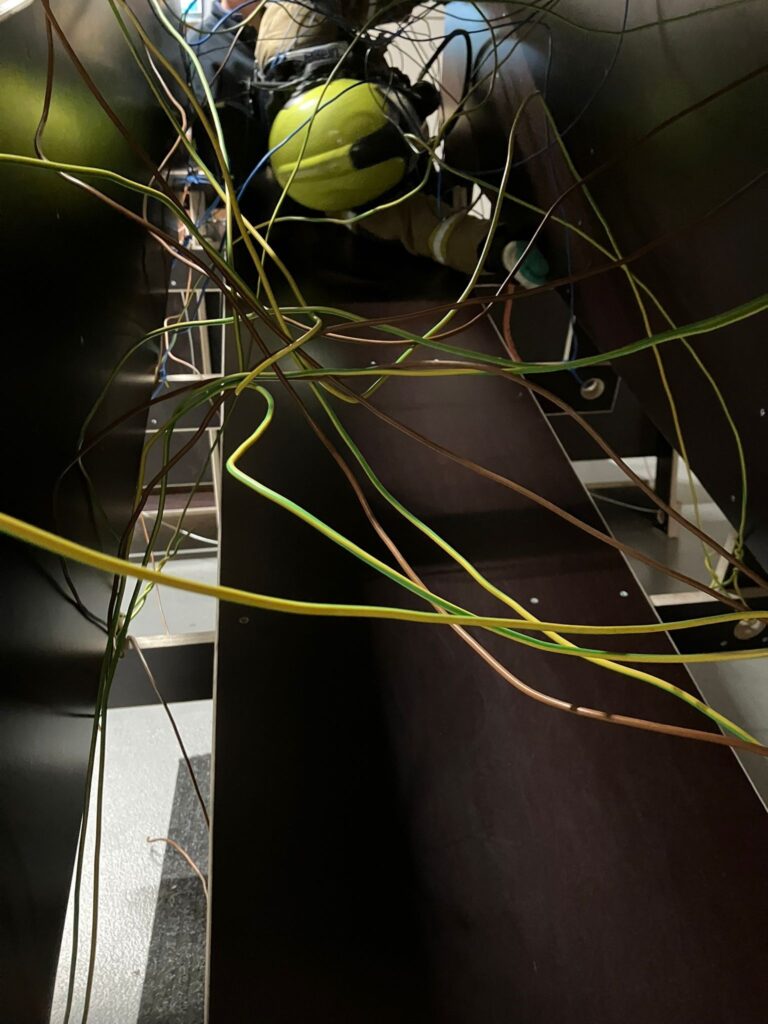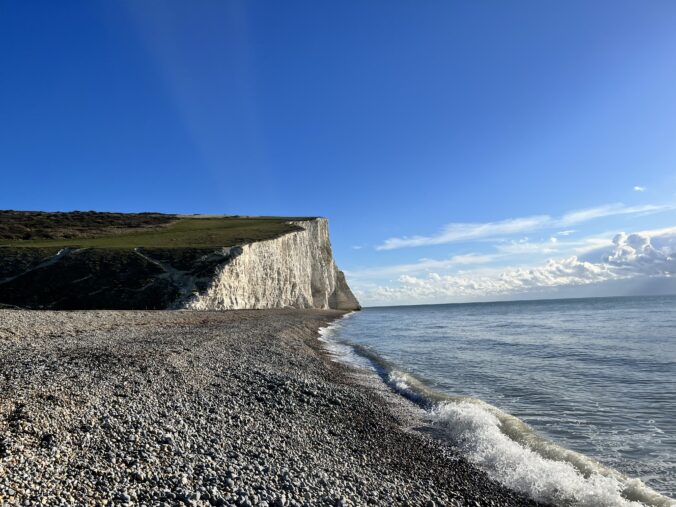I hear my father
in a Bach sonata
the peeling of an orange
a shuffling newspaper
I hear my father
in a pounding hammer
a spinning drill
a sawblade on wood
I hear my father
in wooden shoes on gravel
the clucking chickens
dirt scraped off a spade
I hear my father
in the sizzling of oil
the cobek and ulekan (Indonesian mortar and pestle)
the skimmer in the wok
I hear my father
in a scraping chair
the pen on a school test
the slurping of coffee
I hear my father
in the splitting of firewood
the cracking of fire
content rubbing hands
I hear my father
in a plopping wine cork
a purring cat
a book being opened
I hear my father
in the laugh over a joke
said by another
or said by himself
Listen.
Oh, pickle jar
turning, twisting, trying
hard working for gherkin
If dinosaurs could talk, they'd surely swear
At comets hurtling down out of nowhere
Demise from space, turning the day to night
Rage rage, against the dying of the light
Crusty Calico Cat
Tired, Turning Twenty
Slowly Slipping, Senile
More Midnight Meowing
Brittle Bag of Bones
Gangly Greasy Geriatric
Mere Months? Maybe?
Just One More Summer.
To Lay in The Garden.
To Sleep in the Shadow.
In Smell and Shade of Tomato Plants.
To Bake on Stones, Heated in Summer Sun.
To Chatter at Birds, Many Years Younger.
Just One More Summer.
It was Heraclitus the wise
who never set foot in the same river twice
While Parmenides would have objected
that change is not to be expected.
Thus everything stayed as it was
and nothing ever came to pass.
God omnipresent - where then can I hide?
my sin and filth; my buried deeds conspire
There is no refuge, none! Not far nor wide
Deo volente, divine grace or ire
My breath constricted by this turtleneck
Head to the store, perhaps they'll take it back
The curtains in the window billow free
Sometimes I count to four, sometimes to three
My love, this fruitful garden grows for you
But would you mind if I grew roots here too?
"The speed of Nighting" My candle's flame, a call to heal the sick Many are dying, better make it quick Help dying people - it's what makes me tick
You were not meant to swim but a wave pulled you in
The frigid salt water pulled you from your slumber
How can you get back if you don't know how to swim
Sometimes you can feel it is pulling you under
This terribly tiring and terrified thrashing
drifting further out as the waves keep on crashing
attempting to stay where the sea and land meet
fighting spirit fading, resolutions recede
Submerge in the dark, and fight to draw breath
sans strength succumbing, preparing for death
engulfed by acceptance, confronting your fate
you float to the surface; the water is great!
Outside, last day of summer
Fall's first drops falling
A breeze picks up
Raincoat, my old friend.
Crown nails and a spear Swallowed down just like Jonah Get out in three days
Come join the church, beckons that kindly Pope
Reverse the Reformation, it's a cope
I cannot sola fide, got no hope
I'm shelving that Calvin
There are strange people in your house.
Helmets on their heads, bottles on their backs.
Rush in, they did. Asked if you were okay.
Walked past you, moving you aside.
Dousing things, grabbing things, moving things.
Asking what you were doing when the fire started.
Meatballs. From the fridge. Someone had
dropped them off yesterday. Kissed your cheek.
You told her she looked like your daughter.
That's a fine supper tonight, you thought.
Heat them up, on the stove. Blue gas flame
under tupperware. Smoke. Some siren started.
And now there are strange people in your house.
All future fire captains are subject to DISC
it will divine who's the leader and who is the risk
but let no one point out it's a desk horoscope
destiny in four colors, no way out, no hope.
And while you think servants can be leaders as well
even though that's not something this model can tell
We'll prophesy that you'll fail, or that you'll lose control
Because our 20 questions have shown us your all.
It's not easy to live
or to have a few breathers
when your gut's full of blood
'cause you fell 20 meters.
There is saggy skin sloshing
while I perform CPR
we both know it's pointless
and yet here we are.
Not much left of your thorax,
the structure's all gone.
Expecting cracking of ribs
yet hear the scrunch of puffed corn.
Don't give me that blank stare.
I'm trying my best!
It's been thirty minutes,
and I could use some rest.
Covered you with a sheet,
and we've cleaned up our gear.
I'm sad, tired, beat.
Hated finding you here.
I JUST WANT TO KNOW WHY.
I heard you have kids.
What went wrong in your life?
Why leave them like this?
With apologies to Wilfred Owen
The peaceful emptiness of dreams. Then -
the fire pager interrupts my sleep
where am I? Fire! Clothes! I need them -
whipped into action by the repeating beep
Bolting outside, cool morning air unnoticed
making one's way towards the engine house
by car, by bike, on foot: others approaching
the siren song is answered without pause
Helmets and suits; an ecstasy of fumbling
jump in the truck; "guys, what is the call?"
ambulance asking assistance; not unusual
we're extra hands. Likely that will be all.
Drive to the scene; too early for our sirens
still waking up, we try to find out more
"It's a hanging, boys" - suddenly it's serious
not just the extra hands we thought before
We're here; ambulance medic greets us
The captain walks ahead; he'll go and see
we must remain; anxious awaiting orders
all the while wondering: "who could it be?"
"It's one of us." No way! It can't! How could it?
Walking forward in our disbelief
Oh God. His coat, his shape, but hanging
go on! there's work to do, no time for grief
Tied to a balcony, out there facing the street
just hanging there. All stiff and cold and gone.
We must ensure the waking world won't meet
this awful sight; we'll cover under dawn.
"Don't look." Too late: his closed eyes staring
we spread out tarps, gaze burning in our backs.
Neighbours awake! And we are still preparing
work faster, now; cover the desperate tracks.
The task is done; pack up and drive the truck back.
We joke, we laugh; we mustn't show the pain
Back at the engine house, helmets and suits off
no smell of smoke. Just memories remain.
Big lumbering guy, with hands the size of shovels.
Mischievous smile, a twinkle in his eye
No signs of pain. But yet enough to kill him.
Could I have saved him, if I had known why?
In his song Ella se esconde (“She hides herself”) the Panamanian musician and politician Rubén Blades writes about a mysterious woman who has “tangled him in her mess, and has stolen his heart”.
Me has enredao en tu revulu
y me has robado el corazón!
A recurring line in his song about that woman — mystifying him yet carrying his ring around her finger — describes how she hides herself. She is his, yet hidden. She is close to his heart, yet unreachable.
Ella se esconde atras la esquina de su sonrisa.
She hides behind the corner of her smile. When you read this, an image may very well come to mind. Perhaps of a young woman, smiling yet turned away. Perhaps of just the corner of a smile, hiding everything else behind it.

In Film Theory: The Basics, film director Kevin McDonald quotes Jean Epstein‘s lyrical description of a smile as recorded in Richard Abel’s French Film Theory and Criticism,
Muscular preambles ripple beneath the skin. Shadows shift, tremble, hesitate. Something is being decided. A breeze of emotion underlines the mouth with clouds. The orography of the face vacillates. Seismic shocks begin. Capillary wrinkles try to split the fault. A wave carries them away. Crescendo. A muscle bridles. The lip is laced with tics like a theater curtain. Everything is movement, imbalance, crisis. Crack. The mouth gives way, like a ripe fruit splitting open. As if slit by a scalpel, a keyboard-like smile cuts laterally into the corner of the lips.
Richard Abel, French Film Theory and Criticism (1988)
McDonald reflects on Epstein’s work,
Epstein’s enamored tribute to the close-up of a mouth as it begins to smile redoubles film’s formal powers. His poetic language makes the object he describes strange and unusual, nearly indecipherable, but in doing so, he also foregrounds the bewitching microscopic details of human physiognomy, transforming an otherwise mundane and entirely unremarkable action into something uncanny and enchanting.
McDonald, Kevin, Film Theory: The Basics. (2022)
McDonald considers type of reflection on the close-up — something not generally used in painting, but experimented with in film — a part of photogénie, that synthesis of the technological and the aesthetic that was such a part of the early French film culture during the late 1800s and early 1900s. Bringing out a new perspective and focus through selective focus.

The smile, inviting — beckoning, perhaps — yet at times evading and obscuring. As Blades sings:
Yo me la quedo mirando.
No sé qué estará pensando,
con su cara de Mona Lisa.
I keep looking, although I do not know what she is thinking. With her Mona Lisa face.
Hiding behind the corner of her smile.
Give it a listen.
Matthew Arnold wrote his famous poem “Dover Beach” likely around the late 1840s. It has strong elements of romanticism:
The sea is calm tonight.
The tide is full, the moon lies fair
Upon the straits; on the French coast the light
Gleams and is gone; the cliffs of England stand,
Glimmering and vast, out in the tranquil bay.
Come to the window, sweet is the night-air!
yet this is soon followed by sadness.
Only, from the long line of spray
Where the sea meets the moon-blanched land,
Listen! you hear the grating roar
Of pebbles which the waves draw back, and fling,
At their return, up the high strand,
Begin, and cease, and then again begin,
With tremulous cadence slow, and bring
The eternal note of sadness in.
Hope, light, and sweet night air
are carried by notes of despair
And all this in a Victorian time of faith in technological progress. The Great Exhibition in Paris would open its doors in 1851, showing the world the Things To Come: Leech-using barometers (no, really — have a look), photography, pay toilets, firearms…
Ah yes, firearms. There might have been some rumblings in Europe, but weren’t there always? It wouldn’t be until 1884 before Hiram Maxim would develop the first firearm that combined the words “machine” and “gun”.
In 1882 I was in Vienna, where I met an American whom I had known in the States. He said: “Hang your chemistry and electricity! If you want to make a pile of money, invent something that will enable these Europeans to cut each others’ throats with greater facility.”
Hiram Maxim
Arnold continues:
Sophocles long ago
Heard it on the Ægean, and it brought
Into his mind the turbid ebb and flow
Of human misery; we
Find also in the sound a thought,
Hearing it by this distant northern sea.
Sophocles. That playwright who makes the Antigone chorus cry:
Happy are they whose time has not tasted disaster.
Sophocles’ Antigone (excerpt) translated by Robin Bond
For a house that is shaken by gods, there the curse
fails not at all, but floods each generation in turn:
just so the swell and the surge, pushed hard by grim
blasts of storm winds from Thrace, scouring the crests
of the deep, darkling sea, stirs up the black silted sands,
beneath where the wracked and abutting cliffs resound.
Moving the poem’s theme of sea and beach along on the “turbid ebb and flow of human misery”, there follows a melancholic yearning for when the Sea of Faith was as full as that distant northern sea.
The Sea of Faith
Was once, too, at the full, and round earth’s shore
Lay like the folds of a bright girdle furled.
But now I only hear
Its melancholy, long, withdrawing roar,
Retreating, to the breath
Of the night-wind, down the vast edges drear
And naked shingles of the world.
Arnold, though an atheist, still seems to yearn for that faith that he has found wanting and ebbing. Those “naked shingles of the world” without faith remind me of the madman’s speech which Nietzsche’s would write some years later in The Gay Science:
Is there still any up or down? Are we not straying, as through an infinite nothing?
Friedrich Nietzsche, the gay science (1882, excerpt)
Do we not feel the breath of empty space?
Has it not become colder?
Is not night continually closing in on us?
Do we not need to light lanterns in the morning?
Feeling this breath of empty space, this retreating roar of the surf on so many pebbles, the naked shingles of the world, Arnold lunges for a stronghold:
Ah, love, let us be true
To one another! for the world, which seems
To lie before us like a land of dreams,
So various, so beautiful, so new,
Hath really neither joy, nor love, nor light,
Nor certitude, nor peace, nor help for pain;
And we are here as on a darkling plain
Swept with confused alarms of struggle and flight,
Where ignorant armies clash by night.
The existential conclusion attempts to harness love as that which can move us from having to face the naked shingles of the world. Even though this world “hath really neither joy, not love, not light, not certitude, nor peace, nor help for pain”.
I can’t help but find the poem prophetic at times. Arnold writes full of romanticism, existential dread and despair during a time of great optimism in progress. Yet his ignorant armies clashing by night would eventually clash in that Great War. That same war that would have Wilfred Owen produce this other great poem, yet take his life all the same.
If you could hear, at every jolt, the blood
Wilfred Owen, “Dulce et decorum est” (excerpt, written during WW1),
Come gargling from the froth-corrupted lungs,
Obscene as cancer,
Bitter as the cud
Of vile, incurable sores on innocent tongues,–
My friend, you would not tell with such high zest
To children ardent for some desperate glory,
The old Lie: Dulce et decorum est
Pro patria mori.
In 1780, Luigi Galvani discovered that when you put electrical current through a severed frog leg, it’d twitch. This would eventually lead to the development of the Galvanometer.

Hence imagine you are doing some home improvement, and want to verify whether a wire is live. But alas, you don’t have a galvanometer handy – and while you could turn off the power mains, well, that’s too much trouble.
How about using a test light? Alas! You don’t have one and the stores are closed…

Instead! Head to the nearest pond, and catch yourself a frog. Or even better, catch yourself a few, because you’ll need to replace your frog’s leg galvanoscope every two days…

In the 14 years that I’ve been a volunteer firefighter, our training has always evolved. The risks of firefighting are varied and change with time. Hybrid and full-electric cars — with more than just a single or double airbag in front — are just an aspect of the larger energy transition. Solar panels, hydrogen, the increase of heat pumps — this changing landscape is something we move along with in our training.
That said, an old-fashioned structure fire can still carry plenty of surprises of its own. You may be navigating a building, and parts of it may collapse as its structural integrity is weakened by the heat. And now you’re stuck.
Recently we’ve been using a new training aid. Wooden board tunnels, with inside either rope webbing, or strung strands of electric wire. The tunnel can be simply horizontal, or positioned at an angle, allowing for either climbing or descending. The exercise is to make it from one end to the other. With the earthquake tragedies in Syria and Turkey fresh in our minds, we set to test ourselves.
Depending on your approach, you might go head-first into the horizontal tunnel. Tugging at one part of the web, tightens it somewhere else. You make some room. Now part of the web snags behind your air bottle. Moving only gets you tighter stuck. You didn’t have a lot of room to move to begin with, and now even less. You’re starting to warm up in your suit and breathing gear.

While there are several ways to deal with this exercise, the most important rule to keep in mind is: take your time, conserve your air, and remain calm. Figure out why you are stuck, slowly untangle yourself, and try again.
In the horizontal tunnel, this is fairly easy. Move yourself back a bit, get yourself free by feeling where you are currently stuck, and try again. Maybe move into a slightly different position, try a new approach.
But moving down an angled tunnel, this is different. You’re also dealing with your own weight. You need to keep yourself in place, and conserve your breathing while you’re heading down head-first. Staying calm is key. Pushing yourself back up to try something else costs air and energy, making you sweat more.
Most advice here can in some way be applied elsewhere. Software development, for example. I can think of many a time where I was stuck on a problem — a bug, some code that just wouldn’t work as intended — and the solution turned out to be to take my time, take a breath, try again. Or try another approach. Don’t stress out – remain calm. Let that subconscious mull it over. Go for a walk, take a shower, grab a cup of coffee… get away from the problem for a bit. When you come back to the problem, you might suddenly see what has you unable to move forward.
Even when in a tighter spot — a deadline, a problem on production, let’s say — these principles remain. More often you’ll get more stuck rushing through. Or make the situation worse. You get the idea.
When handling an incident, running up a set of stairs while carrying equipment, it’s still wiser to catch your breath for 30 seconds before masking up, than to rush, be winded, and run through your air too fast.
I’m looking forward to some more training with these tunnels – let’s see how I do if some buddies flip the tunnel upside-down when I’m halfway through.
And finally – don’t be afraid to ask for help. As firefighters, we enter a building in pairs, and stick close to one another. If you’re stuck and you can’t find a way out – the help you need may come from the next person.



